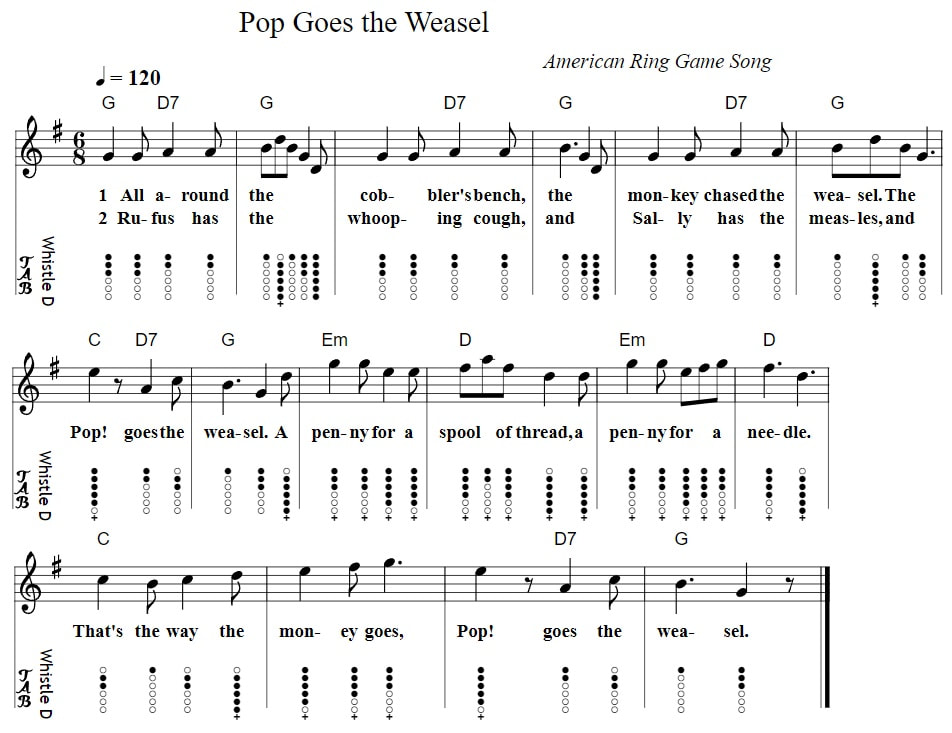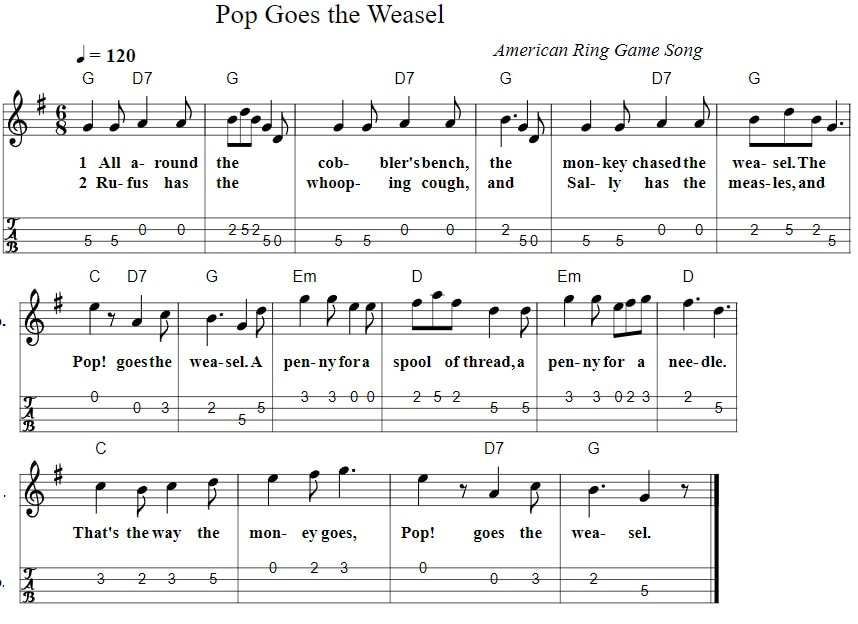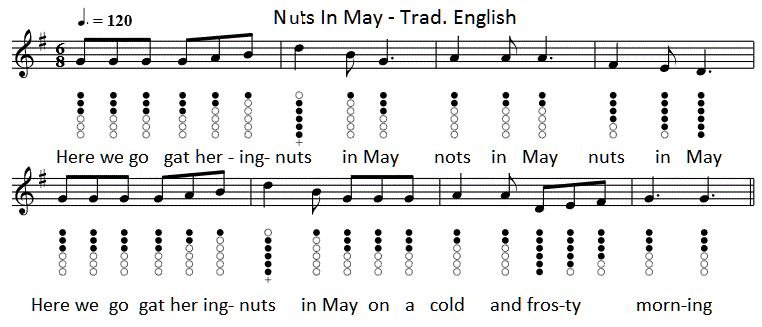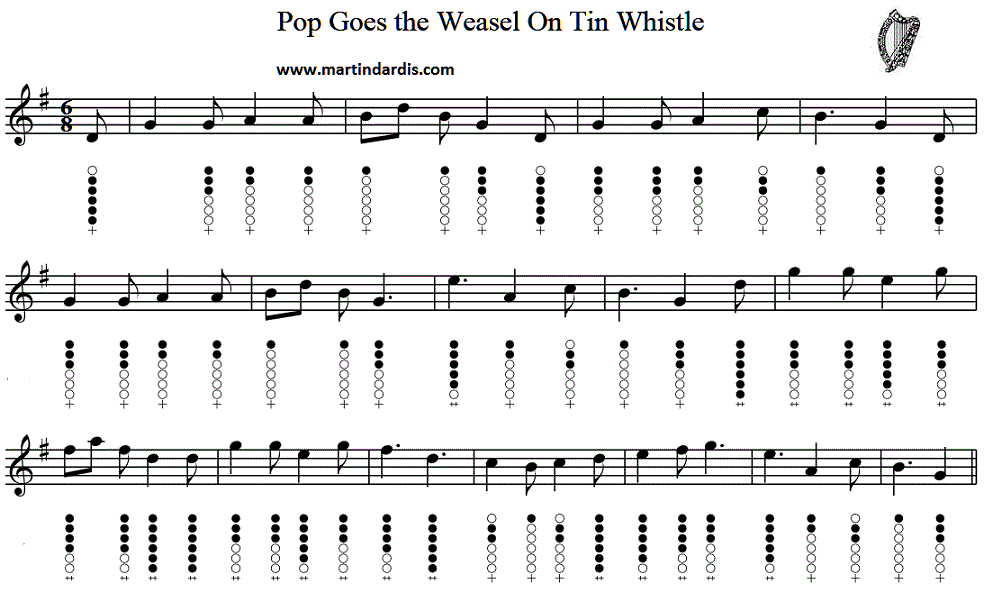Pop Goes The Weasel Tin Whistle notes
Mandolin tab with chords included. Also included on this page is a traditional English tune called ''Here We Go Gathering Nuts'' and sometimes called ''Here We Go 'Round The Mulberry Bush''. Children's Tin Whistle Songs .
Introduction
The song 'Pop Goes the Weasel' is a popular and well-known nursery rhyme that has been passed down through generations. It has become deeply ingrained in popular culture and has been adapted and reimagined in various forms over the years. Despite its simple and seemingly innocent nature, the origins of this song are shrouded in mystery and its meaning has been debated for centuries. In this thesis, we will delve into the history, evolution, and significance of the 'Pop Goes the Weasel' song, exploring its cultural impact and enduring popularity.
Historical Background
The origins of 'Pop Goes the Weasel' can be traced back to the 17th century in England. It was initially a folk dance tune that was popular among the working-class people of London. The song was often accompanied by a dance, where the dancers would circle around each other, mimicking the movements of a weasel popping out of a hole. However, the earliest known printed version of the song was found in a book titled 'The Dance of Death,' published in 1853.
Meaning and Interpretations
The lyrics of 'Pop Goes the Weasel' consist of a simple and repetitive refrain, with each verse ending with the phrase 'pop goes the weasel.' The meaning of this phrase has been a subject of much speculation and interpretation. Some believe it refers to the sound a weasel makes when it pops out of its hole, while others suggest that it could be a reference to the weasel's habit of popping up unexpectedly. Another interpretation is that the 'weasel' symbolizes the working-class people, who were often referred to as 'weasels' due to their perceived cunning and deceitful nature.
Evolution and Adaptations
Over the years, 'Pop Goes the Weasel' has been adapted and reimagined in various forms, from children's books and cartoons to popular music and movies. In the 19th century, it was commonly used as a drinking song in British pubs. In the early 20th century, it became a popular tune for barrel organs and street musicians. In the 1950s, it was recorded by several popular artists, including Elvis Presley and Frank Sinatra, and was featured in many Hollywood films. Its catchy tune and simple lyrics have made it a staple in children's music, with countless versions being recorded and performed by various artists.
Cultural Impact
The enduring popularity of 'Pop Goes the Weasel' can be attributed to its catchy tune and the universal appeal of its lyrics. It has been used in marketing campaigns, featured in TV shows and movies, and has even inspired video games and other forms of media. Its widespread cultural impact can also be seen in the use of the phrase 'pop goes the weasel' in everyday language, often used to express surprise or unexpected outcomes.
Conclusion
In conclusion, the 'Pop Goes the Weasel' song has stood the test of time and continues to be a beloved and recognizable tune in popular culture. Its origins may be shrouded in mystery, but its enduring popularity speaks volumes about its cultural significance. Whether it is a simple children's rhyme or a political satire, this song has captured the hearts and minds of people for centuries and will continue to do so for generations to come.
The song 'Pop Goes the Weasel' is a popular and well-known nursery rhyme that has been passed down through generations. It has become deeply ingrained in popular culture and has been adapted and reimagined in various forms over the years. Despite its simple and seemingly innocent nature, the origins of this song are shrouded in mystery and its meaning has been debated for centuries. In this thesis, we will delve into the history, evolution, and significance of the 'Pop Goes the Weasel' song, exploring its cultural impact and enduring popularity.
Historical Background
The origins of 'Pop Goes the Weasel' can be traced back to the 17th century in England. It was initially a folk dance tune that was popular among the working-class people of London. The song was often accompanied by a dance, where the dancers would circle around each other, mimicking the movements of a weasel popping out of a hole. However, the earliest known printed version of the song was found in a book titled 'The Dance of Death,' published in 1853.
Meaning and Interpretations
The lyrics of 'Pop Goes the Weasel' consist of a simple and repetitive refrain, with each verse ending with the phrase 'pop goes the weasel.' The meaning of this phrase has been a subject of much speculation and interpretation. Some believe it refers to the sound a weasel makes when it pops out of its hole, while others suggest that it could be a reference to the weasel's habit of popping up unexpectedly. Another interpretation is that the 'weasel' symbolizes the working-class people, who were often referred to as 'weasels' due to their perceived cunning and deceitful nature.
Evolution and Adaptations
Over the years, 'Pop Goes the Weasel' has been adapted and reimagined in various forms, from children's books and cartoons to popular music and movies. In the 19th century, it was commonly used as a drinking song in British pubs. In the early 20th century, it became a popular tune for barrel organs and street musicians. In the 1950s, it was recorded by several popular artists, including Elvis Presley and Frank Sinatra, and was featured in many Hollywood films. Its catchy tune and simple lyrics have made it a staple in children's music, with countless versions being recorded and performed by various artists.
Cultural Impact
The enduring popularity of 'Pop Goes the Weasel' can be attributed to its catchy tune and the universal appeal of its lyrics. It has been used in marketing campaigns, featured in TV shows and movies, and has even inspired video games and other forms of media. Its widespread cultural impact can also be seen in the use of the phrase 'pop goes the weasel' in everyday language, often used to express surprise or unexpected outcomes.
Conclusion
In conclusion, the 'Pop Goes the Weasel' song has stood the test of time and continues to be a beloved and recognizable tune in popular culture. Its origins may be shrouded in mystery, but its enduring popularity speaks volumes about its cultural significance. Whether it is a simple children's rhyme or a political satire, this song has captured the hearts and minds of people for centuries and will continue to do so for generations to come.
Pop goes the weasel tin whistle / sheet music with chords
Pop goes the weasel sheet music with chords / mandolin tab
The next tune Nuts In May. When I was playing this song I thought I heard it before, but not the same lyrics. Then it hit me, it's the same tune to a song we used to sing as children in Ireland many years ago that went like this.
No mother I won't get up I won't get up, no mother I won't get up on a cold and frosty morning, If I fry you a rasher and egg, a rasher and egg a rasher and egg. If I fry you a rasher and egg on a cold a frosty morning.
No mother I won't get up I won't get up, no mother I won't get up on a cold and frosty morning, If I fry you a rasher and egg, a rasher and egg a rasher and egg. If I fry you a rasher and egg on a cold a frosty morning.




